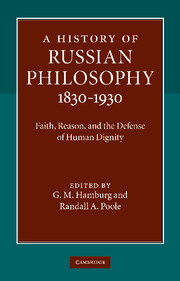Book contents
- Frontmatter
- Contents
- List of contributors
- Acknowledgments
- Introduction: The humanist tradition in Russian philosophy
- I The Nineteenth Century
- II Russian Metaphysical Idealism in Defense of Human Dignity
- 5 Boris Chicherin and human dignity in history
- 6 Vladimir Solov′ëv's philosophical anthropology: autonomy, dignity, perfectibility
- 7 Russian Panpsychism: Kozlov, Lopatin, Losskii
- III Humanity and Divinity in Russian Religious Philosophy after Solov′ëv
- IV Freedom and Human Perfectibility in the Silver Age
- V Russian Philosophy in Revolution and Exile
- Afterword: On persons as open-ended ends-in-themselves (the view from two novelists and two critics)
- Bibliography
- Index
5 - Boris Chicherin and human dignity in history
Published online by Cambridge University Press: 05 June 2012
- Frontmatter
- Contents
- List of contributors
- Acknowledgments
- Introduction: The humanist tradition in Russian philosophy
- I The Nineteenth Century
- II Russian Metaphysical Idealism in Defense of Human Dignity
- 5 Boris Chicherin and human dignity in history
- 6 Vladimir Solov′ëv's philosophical anthropology: autonomy, dignity, perfectibility
- 7 Russian Panpsychism: Kozlov, Lopatin, Losskii
- III Humanity and Divinity in Russian Religious Philosophy after Solov′ëv
- IV Freedom and Human Perfectibility in the Silver Age
- V Russian Philosophy in Revolution and Exile
- Afterword: On persons as open-ended ends-in-themselves (the view from two novelists and two critics)
- Bibliography
- Index
Summary
The assertion that human beings possess inherent value, an innate dignity, is an old one, dating at least as far back as the book of Genesis, in which God declared: “We have made you in our own image and likeness.” The idea was spiritualized by Augustine in his great treatise on The Trinity (written 400–416), which argued that the human faculties of memory, intellect, and will are in the image of the three persons of the Trinity, who embody divine being, divine intellect, and divine will. In his biblical commentaries, Thomas Aquinas associated the image of God strictly with mind, not the body. Yet whether the idea of human dignity was understood in a literal, spiritual, or intellectual sense, it lacked firm roots in the political realm until the Italian Renaissance, when the Italian humanist Lorenzo Valla (1406–1457) linked it with the transformation of secular history through human will. Once Valla's successors began to think about the problem of dignity in history, they confronted the empirical truth that most human beings live in a squalor scarcely suited to sustain a dignified life; moreover, these thinkers faced the terrible moral reality that powerful men often choose to oppose the just life or harbor visions of justice that radically contradict the idea of universal dignity. The tension between dignity as an inherent metaphysically grounded trait of human nature and dignity as a historical project therefore lay at the heart of European philosophy from the Renaissance until the era of Kant and Hegel.
Keywords
- Type
- Chapter
- Information
- A History of Russian Philosophy 1830–1930Faith, Reason, and the Defense of Human Dignity, pp. 111 - 130Publisher: Cambridge University PressPrint publication year: 2010
- 3
- Cited by

